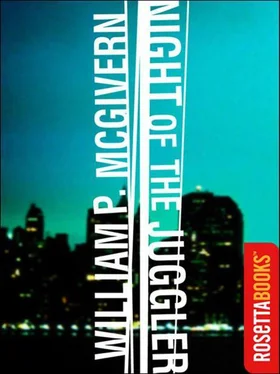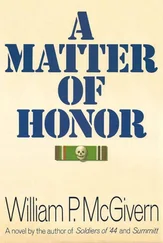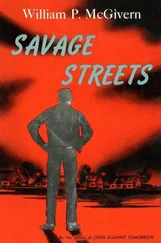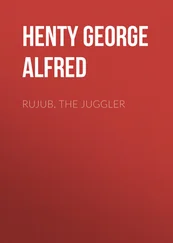William McGivern - Night of the Juggler
Здесь есть возможность читать онлайн «William McGivern - Night of the Juggler» весь текст электронной книги совершенно бесплатно (целиком полную версию без сокращений). В некоторых случаях можно слушать аудио, скачать через торрент в формате fb2 и присутствует краткое содержание. Жанр: Триллер, на английском языке. Описание произведения, (предисловие) а так же отзывы посетителей доступны на портале библиотеки ЛибКат.
- Название:Night of the Juggler
- Автор:
- Жанр:
- Год:неизвестен
- ISBN:нет данных
- Рейтинг книги:3 / 5. Голосов: 1
-
Избранное:Добавить в избранное
- Отзывы:
-
Ваша оценка:
- 60
- 1
- 2
- 3
- 4
- 5
Night of the Juggler: краткое содержание, описание и аннотация
Предлагаем к чтению аннотацию, описание, краткое содержание или предисловие (зависит от того, что написал сам автор книги «Night of the Juggler»). Если вы не нашли необходимую информацию о книге — напишите в комментариях, мы постараемся отыскать её.
Night of the Juggler — читать онлайн бесплатно полную книгу (весь текст) целиком
Ниже представлен текст книги, разбитый по страницам. Система сохранения места последней прочитанной страницы, позволяет с удобством читать онлайн бесплатно книгу «Night of the Juggler», без необходимости каждый раз заново искать на чём Вы остановились. Поставьте закладку, и сможете в любой момент перейти на страницу, на которой закончили чтение.
Интервал:
Закладка:
It was early afternoon, and the sunlight on this lovely fall day dropped through the tawny crowns of changing maples and elms and struck the worn brick walks and green lawns like a shower of copper pennies. And the sunlight fell on the bare and flashing arms of little girls, brown and white and black, caressing them with a shimmering radiance and transmuting all the various colors of their flesh into tones of glowing gold.
Gus heard the growling of the lions from the big zoo at Sixty-fifth Street. That told him the time. Two thirty. That’s when they fed them.
The growling that was like distant thunder made him think of Lanny Gruber. Lanny was his friend. Lanny talked slowly to him, and Gus could understand him.
Children were playing ball on the lawn near Gus, their voices a piping counterpoint to the guttural cacophony of the lions. Old men and women sat nearby feeding peanuts to squirrels. Some of them, with tired, sagging faces, stared with wistful hostility at the romping children.
Neatly groomed businessmen crossed back and forth on their way to Fifth Avenue or Central Park West. Gus was not afraid of them, but in some fashion they diminished him, with the arrogant swing of their briefcases, the fact that they seemed to know things. When Gus thought of them sitting in offices and phoning from one city to another (as he believed was possible) to tell people things, it made him feel small and vulnerable. Still, he wasn’t afraid of them because he knew they wouldn’t hurt him.
Then Gus noticed something that made his big body go tense with fear; a patrolman in a blue uniform was watching him. Policemen would hurt you, he knew. It was his worst fear; not so much being hurt, but knowing no way to make them stop it.
He vividly remembered one of his mother’s anniversaries, and a basement with someone his mother had warned him about, teaching her a lesson, feeling strong and excited, when a door was kicked in and they came at him like raging animals, one big with orange-red hair, the other dark with a terrible scar on his cheek, and Gus had seen all this in splintered bars of light coming through the door they had smashed in. They had shouted at him, fury straining their voices, and had fired at him with guns, but with a strength made boundless by terror, Gus had knocked them down and fled from the basement.
Yes, they would hurt you and never stop it, he thought, staring sullenly and fearfully, but from the corners of his eyes, at the young cop in the blue uniform.
Patrolman Max Prima, who stood rocking on his stout boots while watching Gus Soltik, summed up his first impressions of that hulking figure in one word: “weirdo.” (Patrolman Max Prima had been named after his great-great-grandfather, Massimo Prima, who had lived in Florence and had been distantly related to one of the ancillary branches of the Medici family; Max Prima had become a welterweight finalist in the Golden Gloves as a result of a thousand fistfights connected with that unwelcome bequest from his great-great-grandfather, which his tough, alley-smart peers in Brooklyn had converted into various adaptations such as “Assimo” or “Masturbatio.”
After his triumphs in the Golden Gloves he had had no more fights, but he had become sick of the name Massimo, and despite his mother’s tearful remonstrances, he had legally shortened it to Max.) Patrolman Max Prima was twenty-four years of age. He had become a cop because he admired his uncle, Ernesto, who had been a police officer in the borough of Manhattan and had filled him with stories of historic exploits (largely crap, Max Prima later decided); but there was a primal truth in them which had stirred a romantic streak in his nature, and he had never regretted for an instant buying illusion for reality and putting in for the police department.
Other words were occurring to him as he continued to study Gus Soltik. Hype? No, probably not. Whipdick? Probably. But in the main it was Prima’s instinct that told him Gus Soltik was bad news. A wrongo. It was the way he was looking at those little girls in the children’s zoo. The fact was, this big, hulking man in the brown turtleneck sweater and silly yellow cap was pretending not to look at them. That was what had alerted Max Prima’s interest. He was learning to trust his instincts, as Uncle Ernesto had told him to. It was a thing, a fact, a vector, that veteran cops depended on with an almost implicit faith but that few of them could describe with any accuracy. Uncle Ernesto would say, “You see a woman sitting in a window all week. All month. One day the window is closed. Better check it out. . A family without children taking four quarts of milk a day. . the price of hash dropping. . you keep your eyes open, you see and hear things like that, you check ‘em out, or buck the information up where action can be taken on it.”
Patrolman Prima sauntered toward the bench on which Gus Soltik was sitting, but while he was still twenty yards away, the big man looked at him closely with glazing, narrowing eyes, then stood and walked with heavy, lumbering strides along the curving pathway that would bring him out to Fifth Avenue in the upper Sixties.
Max Prima stopped. So what could he do? Collar him for what? Read him his rights? Slate him at the 22nd Precinct on Transverse Three?
On what charge? Because I got a funny feeling in my gut that he’s trouble? Because he looks sick? He could imagine what the sergeant would say to that.
But because Max Prima was an excellent young cop and would one day be an even better one, he took a pencil and notebook from an inner pocket of his tunic and wrote a careful description of the big man in the brown turtleneck sweater. He wrote:
“Subject: Caucasian, early thirties, six-three, two-twenty or more, moves like he’s fast and strong. Thick blond hair, grows ragged down his neck. Low, round forehead, bulging. Eyes set wide apart. Small nose and mouth, big chin, thick neck. At about 2:30 P.M., October 14, subject was wearing a brown sweater, denim work pants, and Wellington boots with stacked heels. Small yellow leather cap. No cause to interrogate or arrest. But subject was staring at young girls in the children’s zoo in a manner that looked suspicious and unhealthy.
Seemed to have nothing else to do with his time, but took off when I started walking toward him.”
Max Prima decided that the best thing he could do was to get this report over to Lieutenant Vincent Tonnelli’s Special Unit, which had been set up a couple of months ago, with headquarters at the 19th Precinct on East Sixty-seventh Street. (Rumor had it that Gypsy Tonnelli’s assignment came not only from the chief of detectives and the commissioner, but from the man in Gracie Mansion himself. But only after the Gypsy had fought for it.)
The Gypsy would know what to do with it. If anybody could stop the Juggler from making it five in a row, it was that legendary Sicilian cop, Lieutenant Vincent “Gypsy” Tonnelli.
As he circled back toward the arsenal and the lion house, the word blazing like fire in Gus Soltik’s mind was “walls.” This word was Gus Soltik’s mnemonic unit to embrace concepts of fear and uncertainty and unfairness. It warned him that he was being threatened or that a trap was waiting to spring shut on him. The cop frightened him. But it wasn’t fair. The cop was wrong. Gus wasn’t planning to teach a lesson to any of those girls. He knew the one he would teach a lesson to. And it was too early. Not until three. He thought of her in a pair of separate references, which at times blended confusingly into a single baffling semantic unit.
The words she caused to form in his mind were alternately “green skirt” or “white legs.” But when the words on occasion mingled together in a mysterious fashion, they stood out in his mind as “greenropes.”
Читать дальшеИнтервал:
Закладка:
Похожие книги на «Night of the Juggler»
Представляем Вашему вниманию похожие книги на «Night of the Juggler» списком для выбора. Мы отобрали схожую по названию и смыслу литературу в надежде предоставить читателям больше вариантов отыскать новые, интересные, ещё непрочитанные произведения.
Обсуждение, отзывы о книге «Night of the Juggler» и просто собственные мнения читателей. Оставьте ваши комментарии, напишите, что Вы думаете о произведении, его смысле или главных героях. Укажите что конкретно понравилось, а что нет, и почему Вы так считаете.












